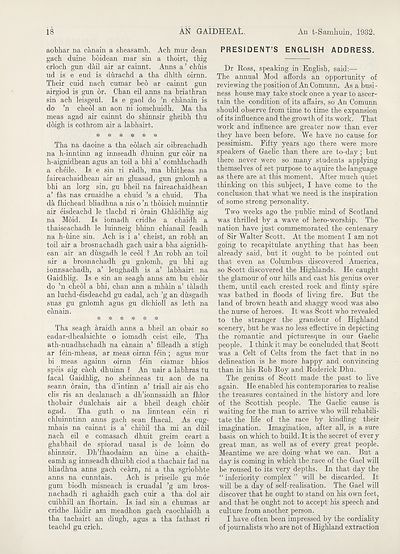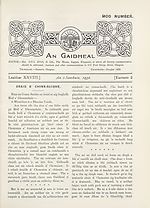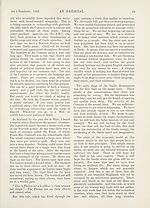An Comunn Gàidhealach Publications > Gaidheal > Volume 28, October 1932--September 1933
(30) Page 18
Thumbnail gallery: Grid view | List view

18 AN GAIDHEAL. An t-Samhuin, 1932.
aobliar na canain a sheasamh. Ach mur dean
gach duine boidean mar sin a thoirt, thig
crioch gun dail air ar cainnt. Anns a’ chilis
ud is e eud is durachd a tba dhith oirnn.
Their cuid nach cumar bed ar cainnt gun
airgiod is gun dr. Chan eil anns na briathran
sin ach leisgeul. Is e gaol do ’n chanain is
do ’n chedl an aon ni iomchuidh. Ma tha
meas agad air cainnt do shinnsir gheibh thu
ddigh is cothrom air a labhairt.
Tha na daoine a tha edlach air oibreachadh
na h-inntinn ag innseadh dhuinn gur coir na
h-aignidhean agus an toil a bhi a’ comhlachadh
a cheile. Is e sin ri radh, ma bhitheas na
faireachaidhean air an gluasad, gun gniomh a
bhi an lorg sin, gu bheil na faireachaidhean
a’ fas nas cruaidhe a chuid ’s a chuid. Tha
da fhichead bliadhna a nis o ’n thdisich muinntir
air eisdeachd le tlachd ri drain Ghaidhlig aig
na Mdid. Is iomadh cridhe a chaidh a
thaiseachadh le luinneig bhinn chianail feadh
na h-uine sin. Ach is i a’ cheist, an robh an
toil air a brosnachadh gach uair a bha aignidh-
ean air an dusgadh le cedi ? An robh an toil
air a brosnachadh gu gniomh, gu bhi ag
ionnsachadh, a’ leughadh is a’ labhairt na
Gaidblig. Is e sin an seagh anns am bu choir
do ln chedl a bhi, chan ann a mhain a’ taladh
an luchd-eisdeachd gu cadal, ach !g an dusgadh
suas gu gniomh agus gu dichioll as leth na
canain.
******
Tha seagh araidh anns a bheil an obair so
eadar-dhealaichte o iomadh ceist eile. Tha
ath-nuadhachadh na canain a’ filleadh a stigh
ar fein-mheas, ar meas oirnn fein ; agus mur
bi meas againn oirnn fein ciamar bhios
speis aig each dhuinn ? An uair a labhras tu
facal Gaidhlig, no sheinneas tu aon de na
seann drain, tha d’intinn a’ triall air ais cho
clis ris an dealanach a dh’ionnsaidh an fhlor
thobair dualchais air a bheil deagh choir
agad. Tha guth o na linntean cein ri
chluinntinn anns gach sean fhacal. As eug-
mhais na cainnt is a’ chiuil tha mi an duil
nach eil e comasach dhuit greim ceart a
ghabhail de spiorad uasal is de loinn do
shinnsir. Dh’fhaodainn an uine a chaith-
eamh ag innseadh dhuibh ciod a thachair fad na
bliadhna anns gach cearn, ni a tha sgriobhte
anns na cunntais. Ach is priseile gu mor
gum biodh misneach is cruadal ’g am bros¬
nachadh ri aghaidh gach cuir a tha dol air
cuibhill an fhortain. Is iad sin a chumas ar
cridhe laidir am meadhon gach caochlaidh a
tha tachairt an diugh, agus a tha fathast ri
teachd gu crich.
PRESIDENT'S ENGLISH ADDRESS.
Dr Ross, speaking in English, said:—
The annual Mod affords an opportunity of
reviewing the position of An Comunn. As a busi¬
ness house may take stock once a year to ascer¬
tain the condition of its affairs, so An Comunn
should observe from time to time the expansion
of its influence and the growth of its work. That
work and influence are greater now than ever
they have been before. We have no cause for
pessimism. Fifty years ago there were more
speakers of Gaelic than there are to-day; but
there never were so many students applying
themselves of set purpose to aquire the language
as there are at this moment. After much quiet
thinking on this subject, I have come to the
conclusion that what we need is the inspiration
of some strong personality.
Two weeks ago the public mind of Scotland
was thrilled by a wave of hero-worship. The
nation have just commemorated the centenary
of Sir Walter Scott. At the moment I am not
going to recapitulate anything that has been
already said, but it ought to be pointed out
that even as Columbus discovered America,
so Scott discovered the Highlands. He caught
the glamour of our hills and cast his genius over
them, until each crested rock and flinty spire
was bathed in floods of living fire. But the
land of brown heath and shaggy wood was also
the nurse of heroes. It was Scott who revealed
to the stranger the grandeur of Highland
scenery, but he was no less effective in depicting
the romantic and picturesque in our Gaelic
people. I think it may be concluded that Scott
was a Celt of Celts from the fact that in no
dehneation is he more happy and convincing
than in his Rob Roy and Roderick Dhu.
The genius of Scott made the past to live
again. He enabled his contemporaries to realise
the treasures contained in the history and lore
of the Scottish people. The Gaelic cause is
waiting for the man to arrive who will rehabili¬
tate the life of the race by kindling their
imagination. Imagination, after all, is a sure
basis on which to build. It is the secret of ever y
great man, as well as of every great people.
Meantime we are doing what we can. But a
day is coming in which the race of the Gael will
be roused to its very depths. In that day the
“ inferiority complex ” will be discarded. It
will be a day of self-realisation. The Gael will
discover that he ought to stand on his own feet,
and that he ought not to accept his speech and
culture from another person.
I have often been impressed by the cordiahty
of journahsts who are not of Highland extraction
aobliar na canain a sheasamh. Ach mur dean
gach duine boidean mar sin a thoirt, thig
crioch gun dail air ar cainnt. Anns a’ chilis
ud is e eud is durachd a tba dhith oirnn.
Their cuid nach cumar bed ar cainnt gun
airgiod is gun dr. Chan eil anns na briathran
sin ach leisgeul. Is e gaol do ’n chanain is
do ’n chedl an aon ni iomchuidh. Ma tha
meas agad air cainnt do shinnsir gheibh thu
ddigh is cothrom air a labhairt.
Tha na daoine a tha edlach air oibreachadh
na h-inntinn ag innseadh dhuinn gur coir na
h-aignidhean agus an toil a bhi a’ comhlachadh
a cheile. Is e sin ri radh, ma bhitheas na
faireachaidhean air an gluasad, gun gniomh a
bhi an lorg sin, gu bheil na faireachaidhean
a’ fas nas cruaidhe a chuid ’s a chuid. Tha
da fhichead bliadhna a nis o ’n thdisich muinntir
air eisdeachd le tlachd ri drain Ghaidhlig aig
na Mdid. Is iomadh cridhe a chaidh a
thaiseachadh le luinneig bhinn chianail feadh
na h-uine sin. Ach is i a’ cheist, an robh an
toil air a brosnachadh gach uair a bha aignidh-
ean air an dusgadh le cedi ? An robh an toil
air a brosnachadh gu gniomh, gu bhi ag
ionnsachadh, a’ leughadh is a’ labhairt na
Gaidblig. Is e sin an seagh anns am bu choir
do ln chedl a bhi, chan ann a mhain a’ taladh
an luchd-eisdeachd gu cadal, ach !g an dusgadh
suas gu gniomh agus gu dichioll as leth na
canain.
******
Tha seagh araidh anns a bheil an obair so
eadar-dhealaichte o iomadh ceist eile. Tha
ath-nuadhachadh na canain a’ filleadh a stigh
ar fein-mheas, ar meas oirnn fein ; agus mur
bi meas againn oirnn fein ciamar bhios
speis aig each dhuinn ? An uair a labhras tu
facal Gaidhlig, no sheinneas tu aon de na
seann drain, tha d’intinn a’ triall air ais cho
clis ris an dealanach a dh’ionnsaidh an fhlor
thobair dualchais air a bheil deagh choir
agad. Tha guth o na linntean cein ri
chluinntinn anns gach sean fhacal. As eug-
mhais na cainnt is a’ chiuil tha mi an duil
nach eil e comasach dhuit greim ceart a
ghabhail de spiorad uasal is de loinn do
shinnsir. Dh’fhaodainn an uine a chaith-
eamh ag innseadh dhuibh ciod a thachair fad na
bliadhna anns gach cearn, ni a tha sgriobhte
anns na cunntais. Ach is priseile gu mor
gum biodh misneach is cruadal ’g am bros¬
nachadh ri aghaidh gach cuir a tha dol air
cuibhill an fhortain. Is iad sin a chumas ar
cridhe laidir am meadhon gach caochlaidh a
tha tachairt an diugh, agus a tha fathast ri
teachd gu crich.
PRESIDENT'S ENGLISH ADDRESS.
Dr Ross, speaking in English, said:—
The annual Mod affords an opportunity of
reviewing the position of An Comunn. As a busi¬
ness house may take stock once a year to ascer¬
tain the condition of its affairs, so An Comunn
should observe from time to time the expansion
of its influence and the growth of its work. That
work and influence are greater now than ever
they have been before. We have no cause for
pessimism. Fifty years ago there were more
speakers of Gaelic than there are to-day; but
there never were so many students applying
themselves of set purpose to aquire the language
as there are at this moment. After much quiet
thinking on this subject, I have come to the
conclusion that what we need is the inspiration
of some strong personality.
Two weeks ago the public mind of Scotland
was thrilled by a wave of hero-worship. The
nation have just commemorated the centenary
of Sir Walter Scott. At the moment I am not
going to recapitulate anything that has been
already said, but it ought to be pointed out
that even as Columbus discovered America,
so Scott discovered the Highlands. He caught
the glamour of our hills and cast his genius over
them, until each crested rock and flinty spire
was bathed in floods of living fire. But the
land of brown heath and shaggy wood was also
the nurse of heroes. It was Scott who revealed
to the stranger the grandeur of Highland
scenery, but he was no less effective in depicting
the romantic and picturesque in our Gaelic
people. I think it may be concluded that Scott
was a Celt of Celts from the fact that in no
dehneation is he more happy and convincing
than in his Rob Roy and Roderick Dhu.
The genius of Scott made the past to live
again. He enabled his contemporaries to realise
the treasures contained in the history and lore
of the Scottish people. The Gaelic cause is
waiting for the man to arrive who will rehabili¬
tate the life of the race by kindling their
imagination. Imagination, after all, is a sure
basis on which to build. It is the secret of ever y
great man, as well as of every great people.
Meantime we are doing what we can. But a
day is coming in which the race of the Gael will
be roused to its very depths. In that day the
“ inferiority complex ” will be discarded. It
will be a day of self-realisation. The Gael will
discover that he ought to stand on his own feet,
and that he ought not to accept his speech and
culture from another person.
I have often been impressed by the cordiahty
of journahsts who are not of Highland extraction
Set display mode to:
![]() Universal Viewer |
Universal Viewer | ![]() Mirador |
Large image | Transcription
Mirador |
Large image | Transcription
| An Comunn Gàidhealach > An Comunn Gàidhealach Publications > Gaidheal > Volume 28, October 1932--September 1933 > (30) Page 18 |
|---|
| Permanent URL | https://digital.nls.uk/127131372 |
|---|
| Description | This contains items published by An Comunn, which are not specifically Mòd-related. It includes journals, annual reports and corporate documents, policy statements, educational resources and published plays and literature. It is arranged alphabetically by title. |
|---|
| Description | A collection of over 400 items published by An Comunn Gàidhealach, the organisation which promotes Gaelic language and culture and organises the Royal National Mòd. Dating from 1891 up to the present day, the collection includes journals and newspapers, annual reports, educational materials, national Mòd programmes, published Mòd literature and music. |
|---|---|
| Additional NLS resources: |
|

